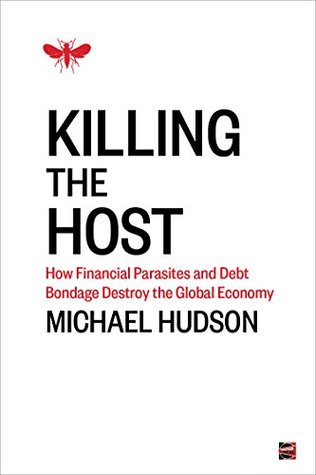Good afternoon, dear friends
We live in a very interesting time, and the reason for our meeting is a direct confirmation of this. I have a very interesting product next to me – the book by Michael Hudson “The Murder of the Master”. It would seem that the next book, as always on the economic topic, what can be curious or unexpected? And this product is completely unique. It so happened that I personally received my education back in Soviet times, and from 80 to 85 I studied at Moscow State University at the Faculty of Economics. We were then taught political economy, this word has been almost forgotten for 30 years. I must say that already at the beginning of the 80s, political economy was already slightly different from the one that was practiced earlier. As for Western political economy, it, as such, ceased to exist in the late 60s. The science of political economy was replaced by a system of managerial knowledge, which is commonly called “economics”. And, as a matter of fact, “economics” has dominated Western economic thought for half a century. And, this replacement is not something mechanical or accidental, apparently, it happened quite deliberately. We will not now determine whether it was good or bad, it just happened. And political economy, at first the word went out of circulation, and then the meaning itself, and the understanding of the deep cause-and-effect relationships of everything that happened, also disappeared from life. And now we are seeing the return of political economy, including in Russia and in the West. This return, shall we say, is taking place timidly, not everywhere, while the paradigm of globalism is still too strong to quickly give up its positions, but the events of the past 15 years indicate that this “feedback” is inevitable. The first giant bell sounded in 2008, when the famous crisis hit… And, in fact, after this crisis, this book was written, it is already 10 years old, in fact, in Russia it appears only now in the form of a translation. What is the book about, why do we strongly recommend that you familiarize yourself with it? This book, firstly, came from a Western economist. Now I will not say, they say, is this the most outstanding Western economist, at least, this is one of the most outstanding economic minds of our time. This does not in any way prevent him from being a brilliant author, the deepest researcher and scientist. The book is about how the world economy really works, and what has happened to it over the past fifty years, how this substitution of economic development took place. Why cannot this system exist forever, why has it developed its resource at the present time, and why the whole world, one way or another, without saying it aloud, is looking for new ways of social economic development? Why was a referendum held in Switzerland several years ago? It ended with a negative result, many experiments in this direction took place in a number of other countries: Germany, Finland, Canada, and so on. The world is looking for new points of support, new levers of control, and in this regard, we recommend that everyone who is interested to familiarize themselves with this book. You will be able to better structure your thoughts and so on.

M. Hudson: Yes, my articles were published in Russia, I spoke before the State Duma three times. The Nobel Memorial Prize is something like a mocking prize for losers, it is given as a reward for not understanding economic sciences, this is a PR campaign for the Chicago School of Economics, for the people who destroyed Russia in 1991. A normal person would not want to receive this award so as not to be among them.
You are the author of many books, among which it may seem that there are whole manuals on plundering countries… You mentioned that you worked at the Manhattan Bank, helping them calculate a certain amount of money that can be pumped out of developing countries. Really?
M. Hudson: That was my job as a balance of payments analyst. The challenge was to calculate how much countries can export. The idea was to leave nothing to them for development, which is how Chase and the other six New York banks appropriated the wealth of developing countries. I was just doing my job.
You’ve spent so much time understanding how financial imperialism works. Do you have an understanding of what the people at the top are guided by?
M. Hudson: This may surprise you, when I worked on Wall Street, all the main economists were Marxists, and this is because Marx understood that someone who understands business education or is engaged in the kind of economics for which you can to receive a Nobel Prize, he does not understand that there is exploitation in principle. There is no free lunch, that is, there is no such that you do not have to pay for something. Exploitation is all about taking what you don’t pay a fair price for. We met once a month with the rest of the economists, quoted the third volume of Marx and laughed.
If we fast forward to our time and you knew about the COVID-19 pandemic, would you write your Master’s Killing book, and especially its final part?
M. Hudson: No, I wrote the book exactly as I intended… I wanted to explain how the system of financial capitalism has developed historically, how it prevails over industrial capitalism in the West. To some extent, the West is driving itself into the situation in which Russia was under Yeltsin, this is exactly what my book is about.
What is useful, for example, to the people of Russia from your book “The Murder of the Master”? What are the main lessons in this book?

M. Hudson: There are two types of income: one is earned income from the useful work of people. For example, salaries or profits of industrial companies. But most of the income in the economy is not earned by useful labor. Most of the income in the economy is economic rent, as Smith and Marx talked about. Marx was the last great economist who studied economic rent as a parasitic income. The historical role of capitalism was to get rid of the landowning class and economic rent, from private monopolies. Getting rid of the private banking sector, turning banks into a public utility economy, this was the main issue of the 19th century. Their idea was for the markets to be free of private bankers, so that all the rent would remain with the government. Russia has returned back to the philosophical view that everything is meaningless and there is nothing worth striving for. Today’s Russian economy is based on parasitic income, economic rent, interest income from banks, and income from most natural resources. Throughout the 19th century, they talked about the fact that all these forms of income should remain with the state, thereby, the state will receive economic rent and create conditions for the growth of industry, and American advisers in the 90s advised Russia the opposite… The Russians believed that the Americans were explaining how to build industrial capitalism, and how they could become like the United States, but the United States did not want Russia to develop in this direction, they wanted to exploit Russia and get that very dinner at the expense of something else. It seems to me that Russia turned out to be the only country where Marx was not seriously studied. In Russia, they did not understand that the key issue of capitalism is economic rent.
Link to source
M. Hudson: Yes, my articles were published in Russia, I spoke before the State Duma three times. The Nobel Memorial Prize is something like a mocking prize for losers, it is given as a reward for not understanding economic sciences, this is a PR campaign for the Chicago School of Economics, for the people who destroyed Russia in 1991. A normal person would not want to receive this award so as not to be among them.
You are the author of many books, among which, it may seem, there are entire manuals on plundering countries. You mentioned that you worked at the Manhattan Bank, helping them calculate a certain amount of money that can be pumped out of developing countries. Really?
M. Hudson: That was my job as a balance of payments analyst. The challenge was to calculate how much countries can export. The idea was to leave nothing to them for development, which is how Chase and the other six New York banks appropriated the wealth of developing countries. I was just doing my job.
You’ve spent so much time understanding how financial imperialism works. Do you have an understanding of what the people at the top are guided by?
M. Hudson: This may surprise you, when I worked on Wall Street, all the main economists were Marxists, and this is because Marx understood that someone who understands business education or is engaged in the kind of economics for which you can to receive a Nobel Prize, he does not understand that there is exploitation in principle. There is no free lunch, that is, there is no such that you do not have to pay for something. Exploitation is all about taking what you don’t pay a fair price for. We met once a month with the rest of the economists, quoted the third volume of Marx and laughed.
If we fast forward to our time and you knew about the COVID-19 pandemic, would you write your Master’s Killing book, and especially its final part?
M. Hudson: No, I wrote the book exactly as I intended. I wanted to explain how the system of financial capitalism has developed historically, how it prevails over industrial capitalism in the West. To some extent, the West is driving itself into the situation in which Russia was under Yeltsin, this is exactly what my book is about.
What is useful, for example, to the people of Russia from your book “The Murder of the Master”? What are the main lessons in this book?
M. Hudson: There are two types of income: one is earned income as a result of the useful labor of people. For example, salaries or profits of industrial companies. But most of the income in the economy is not earned by useful labor. Most of the income in the economy is economic rent, as Smith and Marx talked about. Marx was the last great economist who studied economic rent as a parasitic income. The historical role of capitalism was to get rid of the landowning class and economic rent, from private monopolies. Getting rid of the private banking sector, turning banks into a public utility economy, this was the main issue of the 19th century. Their idea was for the markets to be free of private bankers, so that all the rent would remain with the government. Russia has returned back to the philosophical view that everything is meaningless and there is nothing worth striving for. Today’s Russian economy is based on parasitic income, economic rent, interest income from banks, and income from most natural resources. Throughout the 19th century, they talked about the fact that all these forms of income should remain with the state, thereby, the state will receive economic rent and create conditions for the growth of industry, and American advisers in the 90s advised Russia the opposite. The Russians believed that the Americans were explaining how to build industrial capitalism, and how they could become like the United States, but the United States did not want Russia to develop in this direction, they wanted to exploit Russia and get that very dinner at the expense of something else. It seems to me that Russia turned out to be the only country where Marx was not seriously studied. In Russia, they did not understand that the key issue of capitalism is economic rent.
Link to source
